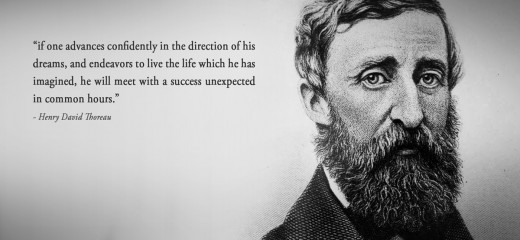
Henry David Thoreau: Pencil Maker to Philosopher
Henry David Thoreau began his working life with a brief stint as a humble but brilliant pencil-maker in his father’s factory. He would go on to greater fame, however, in the field of philosophy, as one of the most influential members of the transcendentalism movement. He possessed a passion for literature and an innate appreciation of the natural world, and this would influence the many essays and books that he wrote. And that work has gone on to provide inspiration to many great leaders, including the likes of Mahatma Gandhi.
Thoreau was born in Concord, Massachusetts, USA in 1817. At the age of 11, in 1828, his parents sent him to Concord Academy, where he impressed his teachers and so was permitted to college, where he graduated in 1833. He then went on to study Greek and Latin as well as German at Harvard University, graduating in 1837.
After college, Thoreau befriended fellow Concord resident and writer Ralph Waldo Emerson. Through their friendship he became exposed to Transcendentalism, a school of thought that emphasises the importance of empirical thinking and of spiritual matters over the physical world.
In 1845, aged 28, Thoreau built a small home for himself on Walden Pond, on property owned by Emerson. Here he wrote Week on the Concord and Merrimack Rivers (1849). The book drew from a boating trip he took with his brother John in 1839 and formed a combination of essays, travel writing, and lyrical poetry.
In 1854, aged 37, he published Walden, or Life in the Woods, inspired by two years, two months, and two days spent living in a cabin he built near Walden Pond amidst woodland. The book captures the virtues of simple living in nature; “Live in each season as it passes; breathe the air, drink the drink, taste the fruit, and resign yourself to the influence of the earth.”
Thoreau’s work is widely recognised as an important contributor to New England transcendentalism, an American literary and philosophical movement. This philosophical movement born in the 1820s and 1830s on the East Coast of the USA was one that promoted self-reliance, intuition, and independence. Thoreau was a remarkable man who had the ability to truly emphasise and beautifully articulate the importance of natural living and being one with nature and the natural world.
Henry David Thoreau died in 1862, at the young age of forty-four. Sadly, throughout his life he was a misunderstood man, and only two of his many full books were published during his lifetime. Thoreau was a man of many talents and interests, primarily a poet but also an author of prose. He was an environmental scientist, a philosopher, a naturalist, tax resister, abolitionist, development critic, land surveyor and historian. Now, his profound life works and writing continue to inspire many people across the globe.
If you want to hear some quotes being read, they can be heard via the following link: